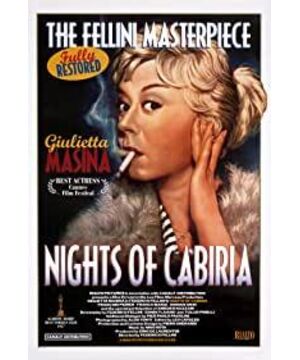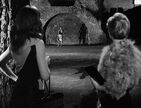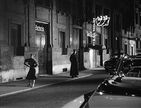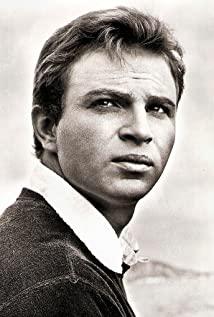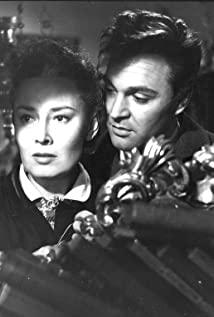Fellini's "The Solitude Trilogy" was almost a one-time read.
When I watched "The Great Road", I didn't feel very surprised, and even had some distaste for the heroine. Why make the heroine so "low IQ", why let her cling to the inhuman Zambano? This is not too "modern".
When I watched "Liar", the scale of the performance was much smaller and the degree of filmization was deeper. The heroine who was too expressive in the last film only played a quiet beauty this time. And the plot of good and evil is more down-to-earth, making people understand, "Oh, this is a story of a liar who was moved and violated the rules and was punished."
Watching "Nights of Cabiria", Fellini returned to the drama we are familiar with The traditional melodrama structure, the meaning of which has evolved too much by now, is incomparable). Whether it's Giulietta's "Chaplin-style" performance, or the dramatic ups and downs of the plot, or the rather dreamy hypnotic magic show, it's full of drama. But this film expresses some of the author's core propositions more directly: the impossibility of religious belief, the plight of innocence, and the redemption in tragedy.
Until then, it was possible to have a basic understanding of Fellini in the 1950s: Fellini, who was named in the name of realism, had an undisguised tendency to drama; On camera, he seems to be better at digging out dramatic and grand-pointing moments in life; behind this series of dramas, an artist's "initial experience" of life can be seen.
I think Fellini should be a director with a considerable talent for drama, otherwise he would not be so keen to present many traditional theatrical themes in the form of films. The image is like his "Seventy-two unique skills", which seems dazzling, but is actually driven by the profound skill of "Little Wuxiang". Compared to "The Bicycle Thief", the most representative work of neorealism, Lao Fei's film is still quite interesting.
The most impressive of the trilogy is "Nights of Cabiria". This is undoubtedly a rather dramatic tragic story. The brainless prostitute, Kabylia, always naively believes in love, so she was deceived and almost died at the beginning. After some struggles and encounters, Kabylia once again placed her hope in a Man, the result was once again deceived heartbroken. If the story ends here, I am afraid that it would have been buried in the dust by now. Fortunately, the director let Kabylia go with a circus-style band at the end, showing a smile in the face of life's difficulties. Of course, this smile cannot change the tragic fact of the film, but it reverses the spiritual tone of the whole film.
To be precise, it is this laugh that makes this film not only different from the vulgarity of traditional melodrama, but also different from the sharp criticism of realism. It adds a dimension of soul to the established destiny and complicated background, and also enables the prostitute Kabylia to have the "divine nature" of the Virgin.
Speaking of the Virgin, I have to mention one of my favorite episodes in this film, that is, the "Pimps" group went to the church to worship the Virgin Mary. The crowded pilgrimage reminds me of Chinese temple fairs. Isn't it just as lively? The same purchase of incense candles, the same folk fanaticism, the same idol worship, the same blessing and disaster relief. I really did not expect that Italy, far away in southern Europe, would have a world so similar to the Chinese dynasty. What the movie presents here is the fragility and hope of the heroine in the crowd. The religious ceremony with such a strong folk atmosphere also makes people whose hearts are locked reveal the most real moment.
Probably because of this reason, when she met the barefoot missionary again, even though she still refused to admit to believing in God, she was still willing to go to the church to find the priest who was just a pastor to repent - "willing to believe" was actually a result of being accepted by God. It is touching to choose one of the most precious qualities, but at the same time it must be admitted that it has also repeatedly sent her down the path of tragedy in reality.
Kabylia represents those who still have infinite hope for the future and yearn for salvation, who may be the prostitutes and pimps in this film (think of the lame man who confessed his guilt in front of the Madonna), It could be the street performer or the silly woman in The Big Road, or the liars in The Liars. No one wants to spend their life in the quagmire, they are full of hope, and then they meet and die, some singing and dying, some playing the piano and walking on, smiling.
For those who do not know what faith is, accepting such an outcome may be as difficult as accepting God. After all, this requires us to give up too many practical interests and look at the world from the other side of the soul. Just like Kabylia gave up the four million lire in the face of the man who wanted to push her down the river. Augustus in "Liar", isn't the death caused by his love for his daughter in exchange for a self-redemption in the ultimate sense?
In the final analysis, redemption in the true sense often also means sacrifice. Unfortunately, in the dictionaries of most Chinese people, there is no room for the word "salvation", and the meaning of the word "sacrifice" is gradually blurred in the passage of time, which is pitiful and even ridiculous.
View more about Nights of Cabiria reviews


